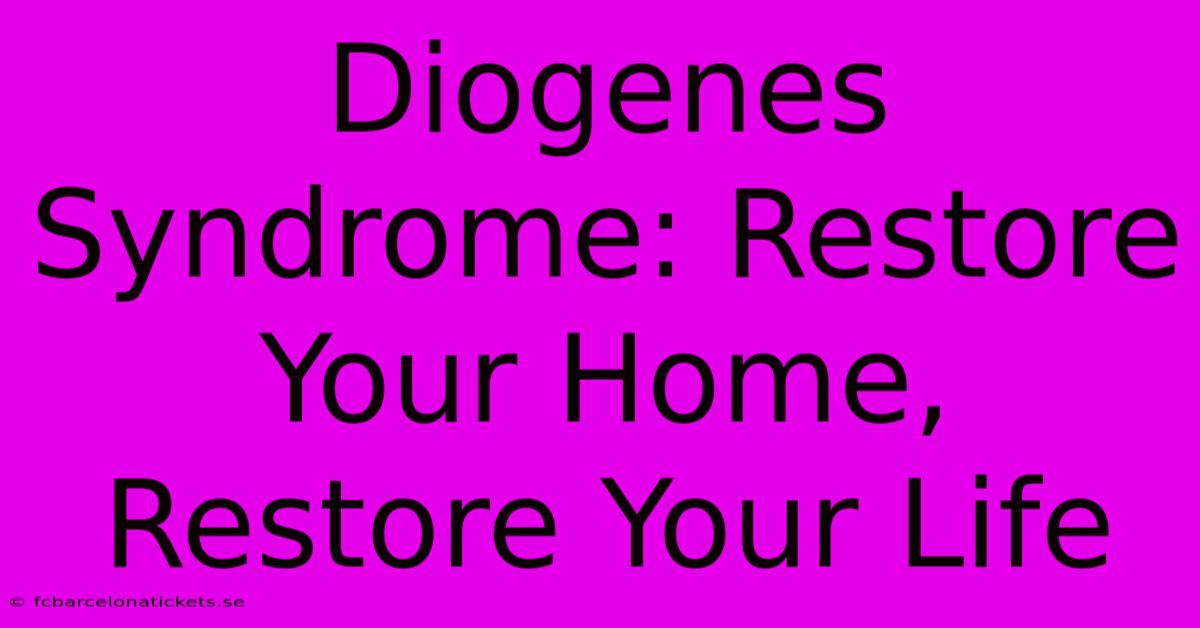Diogenes Syndrome: Restore Your Home, Restore Your Life

Table of Contents
Diogenes Syndrome: Restore Your Home, Restore Your Life
Diogenes syndrome, a complex condition characterized by self-neglect, hoarding, and social withdrawal, can significantly impact an individual's quality of life and even pose serious health risks. Understanding this syndrome is the first step towards effective intervention and recovery. This article explores the multifaceted nature of Diogenes syndrome, offering insights into its causes, symptoms, and crucially, the path to restoration.
Understanding Diogenes Syndrome: More Than Just Mess
Diogenes syndrome isn't simply about a messy house; it's a multifaceted condition involving a profound disregard for personal hygiene, home maintenance, and social interaction. While the exact causes remain unclear, researchers point to several contributing factors:
Potential Causes of Diogenes Syndrome:
- Neurological Factors: Conditions like dementia, depression, and schizophrenia can contribute to the cognitive and behavioral changes seen in Diogenes syndrome. Impaired judgment and executive function play a significant role.
- Psychological Factors: Severe social isolation, trauma, and personality disorders can lead to withdrawal and a decline in self-care. Feelings of hopelessness and apathy are common.
- Social Factors: Poverty, loss of social support, and difficult life circumstances can exacerbate existing vulnerabilities and contribute to the development of the syndrome.
Recognizing the Signs: Symptoms of Diogenes Syndrome
Identifying Diogenes syndrome early is crucial for effective intervention. Key symptoms include:
- Severe Self-Neglect: This involves a lack of personal hygiene, leading to body odor, uncleanliness, and potential health issues.
- Hoarding: The accumulation of excessive amounts of possessions, regardless of their value or usefulness, often cluttering the living space to dangerous levels.
- Social Withdrawal: Isolation and avoidance of social contact, leading to further deterioration of living conditions and mental health.
- Impaired Cognitive Function: Difficulties with decision-making, problem-solving, and memory can significantly affect the ability to care for oneself and one's environment.
- Health Risks: Diogenes syndrome significantly increases the risk of infections, malnutrition, falls, and other health complications.
Restoring Your Home, Restoring Your Life: A Path to Recovery
Successfully addressing Diogenes syndrome requires a multi-pronged approach that tackles both the physical and psychological aspects of the condition:
1. Professional Assessment: The First Crucial Step
A comprehensive assessment by a healthcare professional is essential. This will involve a thorough medical and psychiatric evaluation to identify underlying conditions and rule out other potential causes.
2. Addressing Underlying Medical and Psychological Issues:
Treating any co-existing conditions like depression, dementia, or other mental health issues is paramount. Medication and therapy can significantly improve symptoms and overall well-being.
3. Creating a Support System: The Power of Community
Building a strong support network involving family, friends, social workers, and mental health professionals is crucial. This provides much-needed assistance and prevents isolation.
4. Gradual Decluttering and Home Organization:
This should be a slow and collaborative process. Avoid overwhelming the individual; instead, focus on small, manageable steps. Professional organizers can be invaluable in this phase.
5. Promoting Self-Care and Hygiene:
Encouraging regular bathing, grooming, and healthy eating habits is vital. Gentle encouragement and positive reinforcement are far more effective than criticism.
6. Long-Term Care and Maintenance:
Ongoing support and regular check-ups are critical to prevent relapse. This might involve home care services, regular visits from support workers, and ongoing therapy.
Hope and Recovery: A Future Without Diogenes Syndrome
While Diogenes syndrome presents significant challenges, recovery is possible with the right support and intervention. By addressing underlying medical and psychological factors, building a supportive network, and implementing gradual improvements in self-care and home environment, individuals affected by Diogenes syndrome can reclaim their lives and experience improved well-being. Early recognition and professional help are key factors in fostering a successful path towards restoration. Remember, seeking help is a sign of strength, not weakness.

Thank you for visiting our website wich cover about Diogenes Syndrome: Restore Your Home, Restore Your Life. We hope the information provided has been useful to you. Feel free to contact us if you have any questions or need further assistance. See you next time and dont miss to bookmark.
Featured Posts
-
Unrivaled Quality Messi 2015 Barca Jersey
Apr 03, 2025
-
Fc Barcelona 15 16 Jersey Your Connection To Barca History
Apr 03, 2025
-
September In Barcelona History And Culture
Apr 03, 2025
-
Prediction Celta Vigo Vs Barcelona A Detailed Analysis
Apr 03, 2025
-
Barcelona Tapas Old Towns Authentic Flavors
Apr 03, 2025
